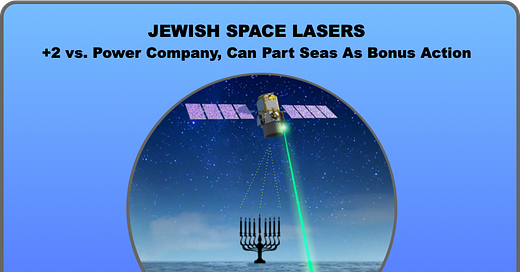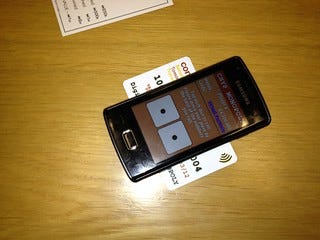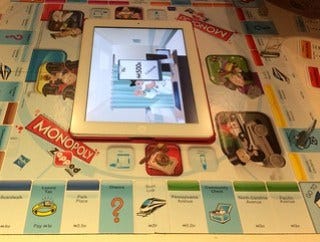Cashless Monopoly And Teaching Financial Literacy
Can we improve financial literacy through games. Probably not, but it doesn't matter.
Dateline: Woking, 18th December 2024.
Writing about financial literacy in The Financial Times, Claer Barrett talks about going online to buy the well-known game of childhood capitalist indoctrination, Monopoly. She says that she was "stunned to see that a totally cashless version is now available”. Well, I hate to be that guy, but actually cashless Monopoly has been around for as long as I’ve been writing blog posts about cashlessness.
Monopoly money
In fact cashless Monopoly came out in 2006! Here’s an excerpt from a review at the time:
What would Monopoly be like if it were invented today…? The world has changed amazingly over the last 70 years. This special anniversary edition celebrates 70 years of the world’s most popular board game with a modern day equivalent to the traditional game. Choose from a range of new movers including a mobile phone, roller blade or even a cheeseburger! The rent has skyrocketed sky high in a much more recognisable London. You can build property in Covent Garden, visit the London Eye or make millions in The City! Wheel and deal in the fast lane – millions of pounds, not just hundreds! This Electronic Special Edition features an Electronic Banker Unit and “Debit” Cards that replace the money. Just swipe and you’re away!
In the interests of research I got a copy of the UK Monopoly Electronic Banking Edition and turned to a (then) enthusiastic Monopoly player for a more detailed evaluation, which I cannot resist reposting here:
[Aaron Birch, aged 9] I think that apart from being a good game, it actually teaches little children banking so that when they get older they’ll understand it. It really imitates the 21st century but on a board game. The idea of using credit cards is much more creative than using paper money because you never run out of money, you could go up to 500 million if you wanted to on electronic Monopoly whereas there’s a limit to the money you have in old-fashioned Monopoly. The Community Chest and Chance cards are really modern when some say ‘Your internet company has succeeded, collect 2 million’ which is a modern-day experience. The counters are also modern because there’s one roller blade, one skateboard, one burger, one airplane, one race car and one mobile phone, which are modern-day items. It raises the Monopoly level to a whole new standard because more people would buy the game when they know how much more fun banking is with an electronic device and having a modern-day item as a counter.
Financial literacy? Hhmmmmm…
Usage
Actually, I think that Monopoly tells us so much more about money than you might think! I remember being mildly excited about this cashless society in microcosm and at Consult Hyperion's tenth anniversary Forum back in 2007, the wonderful people at Hasbro very kindly donated a few Monopoly Electronic Banking sets to the event (the proceeds went to charity) and we ran an end-of-day tournament using them. It all went down rather well!
Well, the tenth Digital Money Forum turned out to be a big, big success. The feedback that we received was unbelievable: not only did we all get some new ideas and meet new people, but we had a lot of fun doing it, what with the guided tours of the historic Royal palace of the Tower of London and the Monopoly electronic banking charity tournament.
Within a couple of years, our thoughts had naturally turned to mobile and contactless, so we played a version of the game using contactless cards and NFC phones using some software that I pestered Consult Hyperion's in-house development team (the “Hyperlab”) to put together for the event.
To be honest, I never much liked Monopoly (as a kid I preferred Waddington’s “Battle of the Little Big Horn” and “Escape from Colditz”) but the last time I played it, it was the Monopoly “Zapped” edition where the “bank” is your own iPad rather than a custom piece of hardware. How right this is, on so many levels. To effect a transaction, you simply touch your “ID card” to the iPad when necessary.
Our family verdict on this one was very positive indeed. The contactless interface was quick and simple, it was convenient having the iPad keep track of everything and the game play zipped along at a decent pace. It’s still not really my kind of game — if you want a really good tabletop family game try "Settlers of Catan" or "Ticket to Ride" — but it was fun.
Literacy Lessons
Anyway, back to the FT. Claer was making a point about teaching kids about money but Monopoly teaches them that acquiring wealth is all about acquiring property, not about starting businesses, inventing new products or creating value in other ways. Surely we should encourage children to play games that will teach them more about how to get rich other than by inheriting land or becoming a social media influencer? I can start with a couple of suggestions, but I’d like to hear yours! My kids learnt about the world of finance from:
World of Warcraft. Children can learn all of the key economic concepts from playing this game: supply and demand, comparative advantage, price curves, options and futures, auctions and reverse auctions, arbitrage and so on. They can also learn all of the basic tools of the modern investment banker, including market manipulation, price-fixing, insider trading and shill bidding.
Crunch. This is a card game that teaches the rudiments of banking, and it’s awesome. Each player is a banker and, in essence, you have to collect asset cards so that you can make loans and investments. The really clever (and super realistic) part of the game is that the banker with the most money at the end wins: it doesn’t matter whether their bank goes bankrupt or not. If you over-extend the bank but manage to trouser the treasure before the roof falls in, more power to your elbow.
Illuminati. This remains my favourite table top card game of all time and I’m glad my kids loved it too. It has a superbly clever game mechanic which means that you build up power structures based on secret societies (e.g., The Gnomes of Zurich) but you need money to consolidate the power and you basically can’t win without screwing someone else over. A much better introduction to 21st-century late-stage pseudo-capitalist corporatism than any text book.
Illumanti is more real than Monopoly in so many ways.
Given that, as far as I can tell, most British schoolchildren want to be on reality TV rather than becoming train drivers or farmers, I think Claer might have her work cut out trying to get kids round the table to play a game at all. This is why I think we may as well give up on trying to teach financial literacy at all, basically, and just hand over control of their bank accounts to bots that comply with the FCA Duty of Care.
Are you looking for:
A speaker/moderator for your online or in person event?
Written content or contribution for your publication?
A trusted advisor for your company’s board?
Some comment on the latest digital financial services news/media?








https://photos.app.goo.gl/Vq6NChfvpKtpkyNaA
Mall Madness - as offered by Milton Bradley
Please explain the relevance of the Space Laser card illustrated within the article?